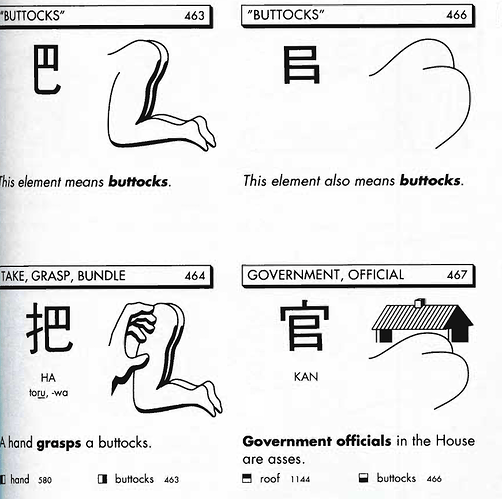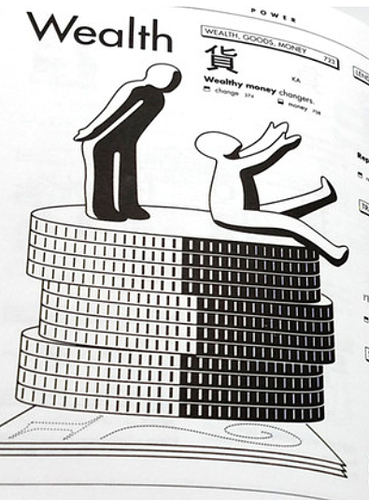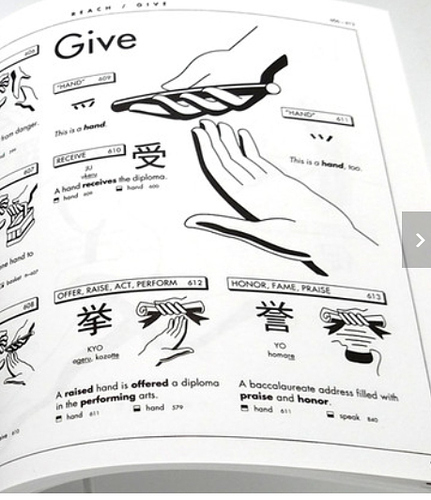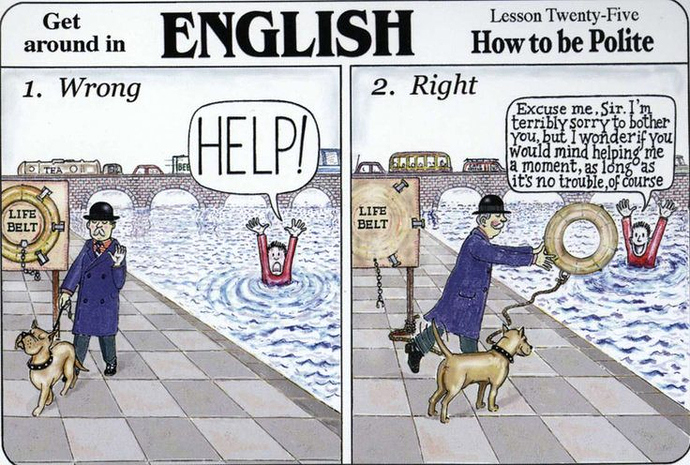Btw: you look very knowledgeable on the matter. Will you share with us the ones that made you laugh? The reason does not have to be etymologically correct (I would be shocked if there would be any dictionary listing 覀 as wardrobe).
Originally the upper part was a different symbol with 2 more hands around the uterus (the giving birth scene) before simplified into that.
And 西 is associated with Spain purely for the S at the beginning because Chinese transliterated it into 西班牙 (si-pan-ya).
It’s not some special knowledge. I have had Outlier etymology dictionary for Chinese for a few year now and recently I got Alex Adler’s dictionary for Japanese as well. Both are electronic so looking up is easy. Alex Adler’s dictionary is really good, there’s a separate index for characters with the same sounds like 効 校 絞 郊 (kou) and then you can look up each of them to see how the meaning is associated with the meaning component.
Not very funny, but I was amazed that there’s some really naked sexism hiding in kanji like:
疾 嫉 same sound but the one with the disease meaning component means disease, the one with the woman meaning component means envy.
嫌 謙 same sound but the one with the speech meaning component means humble, the one with the woman meaning component means hate.
I find them funny as hell. I tease my wife with them pretending I believe Chinese people are so wise that they figured it out so early. She is laughing as well so I guess I am not the only one that finds it funny.
But to give them justice: the idea that women are supposes to be equal to men is less natural to our brains than mathematics. We invented math first. On the scale how hard it was to figure it out it is closer to landing on the moon than to complex numbers. We are lucky we have it now, no point in bulling ancient people for not being smart enough. 
@MacFinch @DJSmellow @EbonyMidget @NickavGnaro @Pep95 @matt_in_mito @nekoyama @s1212z @Aecharjay @ImpactFrames
I think that you might like kanji-pict-o-graphix book.
It is fairly cheap and funny. Not to mention that some mnemonics are based on actual etymology. (and etymology of like 1000 kanjis is explained on the back of the book)
Very interesting, especially if RTK or wanikani doesn’t work for you.
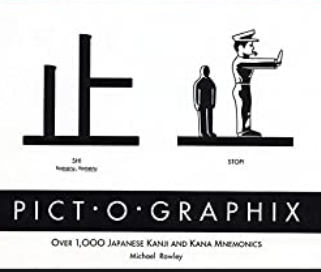
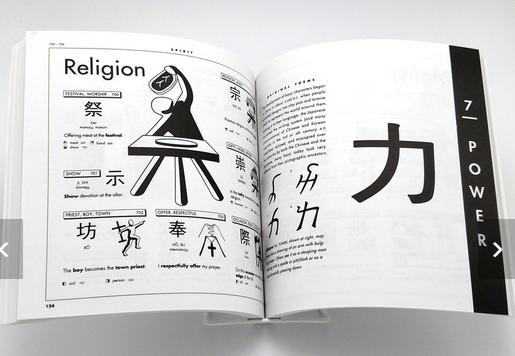
Cheers 
Hey, thanks alot!
Wanikani works great for me so far but I have always wanted to understand the etymology behind certain Kanji and vocab, I’ll look into it!
What’s wrong with Anki? Link to thread?
This one is not really about Japanese per se, but still funny:
I am the only one thinking this guy speaks Japanese as well and on the first image he thinks: “結構です”? xD
I finally got the prove that Toriyama had stolen Dragon Ball. It was too good to be written in modern times. He for sure have found an ancient manuscript and just polished it up.
Let’s have a look:
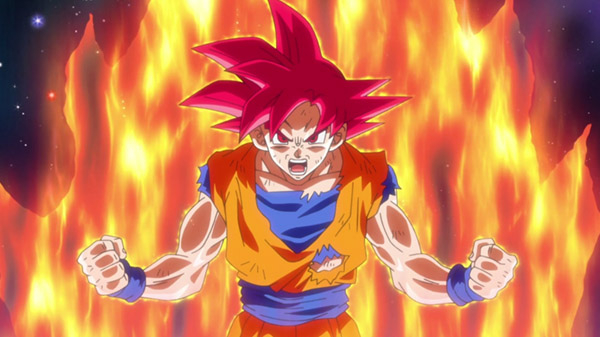
And here a prove:
勇
A male with the strange hair meaning heroism. Even direction of the hair matches. Coincidence? xD
The word for ‘backscratcher’ is 孫の手 meaning ‘hand of grandchild’
I was really confused reading that example sentence.
婚 - marriage
If you like “offensive” ones. That would literally mean “woman’s family name getting day” if you look at radicals alone.
They for sure would be surprise there can be people like me and my wife (we opted to have different surnames since it was not worth arguing over more than 5 minutes) xD
They clearly were thinking about that as transfer from one family to another, when in modern times it is more of a starting point for new family. Or an act of merging two into one if you are lucky and both family like each other (not my case xD).
マンチェスターシティー
Yes they most definitely are :L:L:L
I watched a video (https://www.youtube.com/watch?v=hyXQXDkR26Y) where there was some reasonable worries about marrying foreigners. But one was funny to me since a lady did correct herself. It was something like that:
“I would be worried can’t communicated with our grandchildren spouses” a few minutes later: “Actually… Who cares? We don’t speak to our grandchildren spouses that often any way” xD
That would be a bit of cultural shock for me xD
On top of the Heisig approach, and Wanikani approach, there is plain old Japanese school 教育 kanji learning order. That’s what I did.
Most people do not recommend this, but it worked for me. The only thing that I can strongly positively say about the school grade order is that it teaches easy ‘concepts’ first, rather than easy kanji. This helped me a lot from a logic standpoint, as I felt I could understand the logic of 読み方 used in later kanji, that also appeared in early kanji. But then again, I don’t use mnemonics at all, so I’m a bit weird 
I consider myself - in terms of kanji learning - to be a happy child from an unhappy marriage between Cure Dolly and Heisig. Parents hate each others but since they provided for me and I want to move out asap anyway, it is not my problem xD
I was pretty much exactly the same when I started learning Kanji. I still have my notebooks just full of the Kanji written out 50 times each haha.
I think mnemonics for Kanji are a bit gimmicky, and I don’t understand why the method by which the entire Japanese nation learns Kanji to a higher literacy rate than we learn English is fround upon by foreign learners. I guess we’re just Old Skool
Yeah I was the same. Mnemonics just seemed like even more extra information that I needed to memorize, that doesn’t actually help me communicate at all. But it works for a lot of people.
I would blame it on the philosophy of science if I may. We like our toys that science gave us so we are inclined to adopt some of its core principles. We just do not trust the argument “it was that for centuries for a reason” if reason is not blindly obvious and even then we are not sure.
I don’t say it’s always a good thing. Paraphrasing somebody much smarter than me: “Sometimes we are like monkeys with a wrench trying to repair a military helicopter. Bang! Look: it’s better now!”
I have no clue if that is the case here. But when somebody is proven that his methodology is not working we at least have new knowledge about what is not working.
If you manage to find one thing that works for you at the moment it is good enough for now 
Well there is definite merit is using mnemonics to get to grips with difficult concepts, I’m not sure it works as well as people think when it comes to learning to differentiate between 2000+ very similar looking pictograms though, especially when you get passed kyouiku grade 1 kanji.
For sure it does not work that well, so your distrust is 100% justified 
It would be adapted as common sense by now if it would be even half as good.
I just noticed  we are not in this thread:
we are not in this thread:

Is there a way to move it? It would make better sense there I believe 
Btw: most of those “mnemonics” i do for this thread only xD when something “funny” clicks in my mind.

